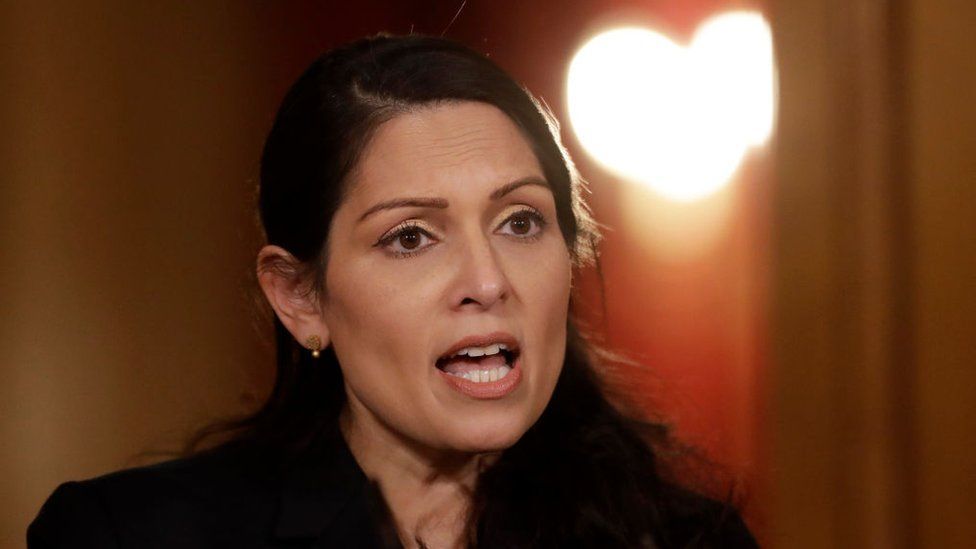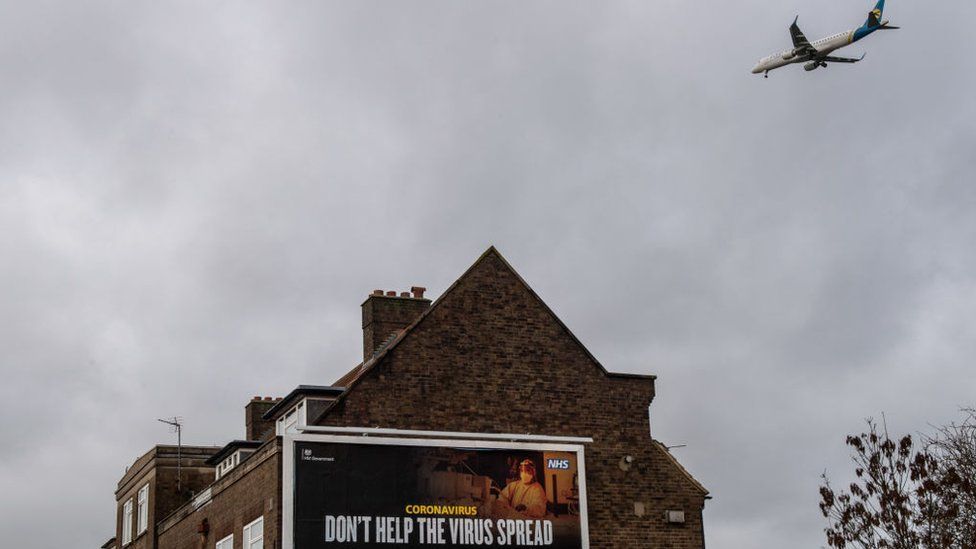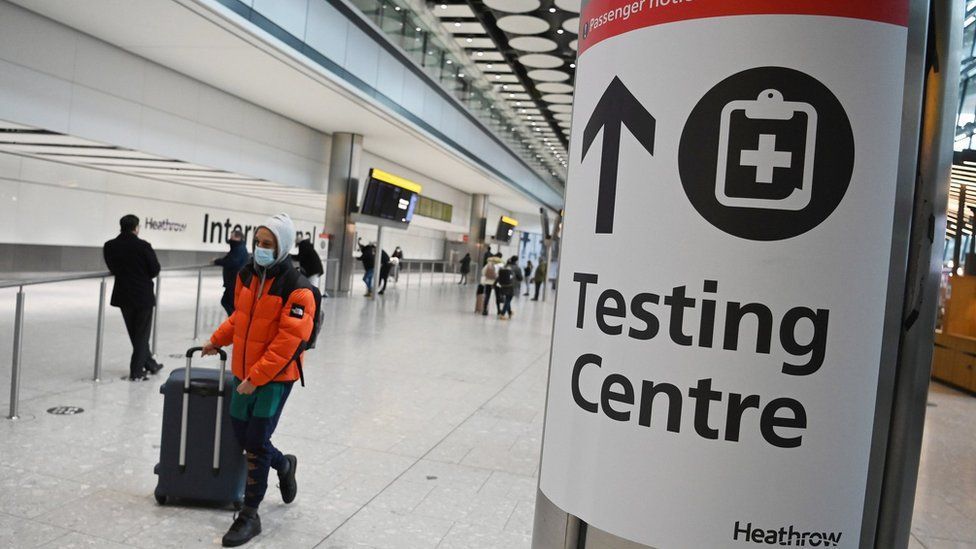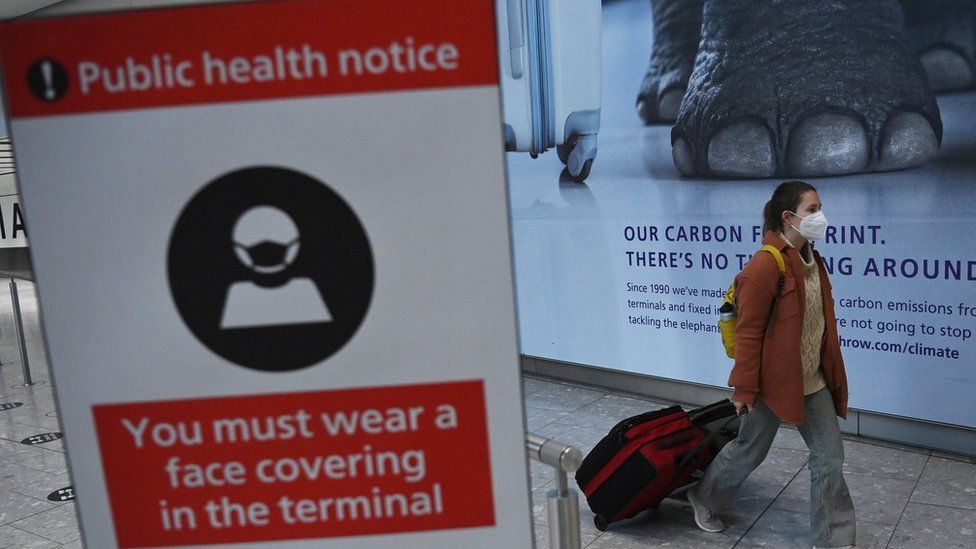
Covid: Why hasn't the UK banned all international flights?
A travel ban already applies to 33 "red list" countries following the detection of new Covid strains in South Africa and Brazil.
But unlike other countries, the UK has never banned international travel altogether. Hotel quarantine has not yet come into force, and tougher border measures only came in relatively recently.
What are the current travel rules?
UK arrivals must provide a recent negative Covid test and a passenger declaration form. They must quarantine at home - or at another location - for 10 days, but can use public transport to get there.
They will soon have to take two coronavirus tests while quarantining. The aim is to provide a "further level of protection" and help authorities track new cases from overseas, given fears the vaccine may be less effective against some of them.
Direct flights from places where new variants may be circulating - such as South Africa - are already banned.
Only essential travel is permitted under lockdown rules, so UK travellers who want to go abroad will soon have to declare their reason for travel.

"We see plenty of 'influencers' on social media showing off about which parts of the world they are in. Going on holiday is not an exemption," Home Secretary Priti Patel has warned.
These tighter rules only started coming in around Christmas time and scientists believe the variants could have reached the UK earlier.
There is also concern over compliance, with one survey suggesting up to a third of arrivals disobey rules to self-isolate at home.
Between 27 March 2020 and to 17 January 2021, 332 fines were issued by police in England to people who did not self-isolate after returning from abroad, and three were issued in Wales.
More than 1.2 million people arrived in the UK by air in July alone.
What is the hotel quarantine plan?
Passengers arriving from certain "high risk" countries will be taken to a hotel where their 10 days of isolation can be monitored.
The policy was announced by Prime Minister Boris Johnson on 27 January but will not begin until 15 February.

Scotland and Wales have suggested the plan does not go far enough.
There will be a "managed quarantine" for all travellers arriving in Scotland, First Minister Nicola Sturgeon says, with details to be announced on Tuesday.
Only targeting certain countries is "not an effective policy," Mark Woolhouse, professor of infectious disease epidemiology at the University of Edinburgh told the BBC.
Concerning variants have usually spread by the time we know about them, he says, and it's impossible to predict where the next one will come from.
"You can shut the stable door, but the horse you are concerned about has already gone, and the other one will bolt from somewhere else," he says.
But he questioned the practicality of a complete border closure, comments echoed by Professor Calum Semple, a member of the scientific group Sage which advises the government.
"You can't do it altogether when you have got a country that is dependent on imports for food and other essential processes. It is just not possible," Prof Semple told the Today programme.
Why didn't the UK shut its borders before it had any cases?
The debate over whether to shut the borders stretches back to the start of the pandemic.
Between January and March 2020, the UK introduced some measures to try to protect itself from the new virus.
Quarantine was imposed on 273 people travelling from Wuhan in China, where the first outbreak was seen. Others from "high-risk countries" including China, Iran and Northern Italy were asked to voluntarily isolate for 14 days.
An inquiry into the pandemic suggested it was understandable the government "did not consider it practical or effective simply to restrict flights" at that time, partly because there were so many British residents trying to get home.

But these self-isolation requirements were withdrawn on 13 March - 10 days before the UK went into lockdown.
"The government's failure to have proper quarantine measures in place in March as the infection was spreading fast was a grave error and meant Covid spread faster and reached more people," Yvette Cooper, chair of the committee of MPs behind the inquiry said.
A recent study found the virus was introduced to the UK "well over a thousand times in early 2020", with a third of transmission chains brought in from Spain, followed by 29% from France, neither of which faced any restrictions. China accounted for just 0.4% of imported cases.
What were the government's reasons?
The Home Office said the committee behind the inquiry was "incorrect in their assertions".
It said keeping borders open helped businesses maintain international connections, boosted the economy and meant people could still travel for essential reasons.
It argued that by mid-March there was "significant transmission" in the UK and any extra travel restrictions at that time would have had a "very marginal" impact.
At a meeting in February 2020, the government advisory committee Sage suggested that cutting the number of infections entering the UK by half would only delay the epidemic by five days.
The scientists estimated that a 95% reduction in imported cases, which would have required "draconian" travel restrictions, would have pushed things back by a month.

What have other countries done?
Australia and New Zealand closed their borders to almost all visitors in March, although travellers from New Zealand can now enter most Australian states without quarantine.
This is currently a one-way agreement - meaning they must do 14 days of managed isolation on their return. And Australians are not allowed in at all, unless they have an exemption such as being in a relationship with a New Zealand resident.
Most foreign nationals are not allowed into Japan unless they are residents. Even then, they have to provide evidence of a recent negative test, get tested on arrival and then isolate for 14 days. Travellers from the UK or South Africa must spend the the first three days of isolation in a government facility and take another test on the third day.










